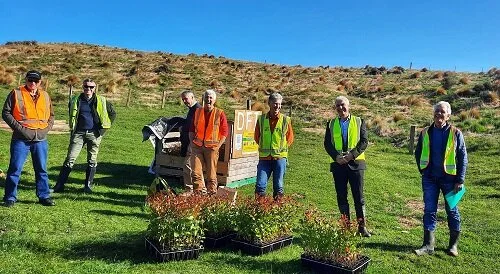Forestry Minister Stuart Nash on Friday planted the first elite XyloGene seedlings of eucalypt species that produce durable heartwood. The planting spearheads a new phase for a project which has already seen more than 30 eucalypt plantations established in suitable regions of New Zealand.
XyloGene is the brand name for these elite seedlings developed in a project led by the New Zealand Dryland Forests Initiative (NZDFI), founded by Marlborough’s Paul Millen. He was recently named Forester of the Year for his 18 years of work developing and leading a nationwide tree-breeding and research programme to create a future NZ hardwood industry.
Forestry Minister Stuart Nash plants the first elite XyloGene eucalypt seedling
Since it formed in 2008 with strong ongoing support from the Marlborough Research Centre, the NZDFI has worked with farmers and landowners in regions from north Canterbury to Northland to establish an extensive network of eucalypt trials and plantations.
The University of Canterbury’s School of Forestry worked with Marlborough Research Centre to establish a tree improvement and forest research programme in eucalypts, with wood quality a major component. This has attracted internationally renowned researchers and supported 11 PhD students.
Proseed, owned by Ngāi Tahu, the largest forest seed producer in Australasia, now propagate XyloGene seed and cuttings.
“We’ve been supported by so many people to get us to this point where we now have a range of viable emerging uses for eucalypts for local use including construction and furniture and even export,” says Paul Millen. “XyloGene nursery stock has proven qualities which will drive new plantings of the forests needed for a future hardwood industry.”
He presented Minister Nash with a bowl, turned from E. bosistoana by Marlborough wood turner Rod Shoemark.
Proseed CEO, Shaf van Bellekom, Canterbury’s School of Forestry head Professor Bruce Manley and Marlborough Research Centre CEO Gerald Hope were among those attending today’s planting at Awatere farmer Warwick Lissaman’s property.
Gerald Hope says Paul Millen’s drive has seen the NZDFI project secure $9 million in funding which has allowed its substantial growth over 18 years of hard work.
“This began as an idea to provide an alternative for the millions of treated pine fenceposts in Marlborough vineyards and now it’s poised to see planting go to a whole new level with these new elite species.”
Update:
Read the Stuff news article about the launch.
Listen to RNZ’s Rural News to hear from Paul himself.


